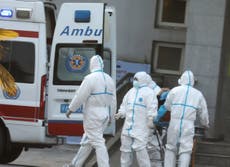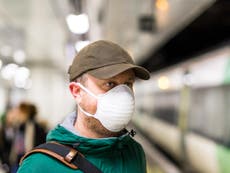Frontline health workers never signed up for self-sacrifice – the government was wrong to only prioritise patient lives
Protecting staff should not just be about respect for what they do or who they are saving – it’s also important to ensure they are safe

Over the past several weeks, ethicists around the world have agonised over arguments about who can die in the pandemic. By who, they have all meant which patients, not which staff.
Discussions have centred almost exclusively in this domain on how to identify those patients best able to benefit from escalation of care. In short, who should get our most precious of limited resources: the ventilator.
These arguments have come from a focus on resource allocation – and rightly so. Italy showed the world that however many ventilators any one country thought they had, it would not be enough. That patients would die unnecessarily without the availability of the right equipment.
Almost everyone thought that meant ventilators. It turns out we were wrong. The rate-limiting, life-saving equipment that will now decide which patients live and die in the UK is personal protective equipment, PPE. Because there is not enough of it to go around.
The workforce was promised that there was enough, but there is not. New guidance, which only last week emphasised single-use PPE for best protection from the virus, has now been issued to explain that actually, some bits of PPE can be reused.
This is not OK.
Without enough PPE, patients will die, as staff are unable and unwilling to treat patients without protection. Rapidly written pandemic guidance has had an almost singular focus on saving as many patient lives as possible. As a result, the lives of a very important part of the pandemic response equation have been left to one side: the safety of frontline staff.
Protecting our frontline staff is not just about respect for what they do or the lives they are saving. From the beginning, the professional bodies have said it is not enough to think about machines: you also need trained staff, properly protected, to run those machines. In failing to procure enough PPE, the UK government has neglected to consider what happens when frontline staff cannot or will not care for pandemic patients because they themselves no longer feel safe.
Healthcare staff, whether they be consultants, nurses or cleaners, sign up to be part of the bigger picture of saving lives. However, with only a few notable exceptions, such as the military, sacrificing their own lives to save others is not part of the bargain.
Moving forward, ethical, clinical and policy guidance must consider saving staff lives as important as saving patient lives. Clinical guidance on escalation of care, especially aerosol-generating procedures, must provide clear guidance on what to do if the PPE required to protect the doctor is not available. Trusts must put into place procedures for when patients die because lack of PPE has meant they could not get the treatment they needed, as that treatment could not be administered safely.
Frontline staff are a precious resource that were in short supply long before the pandemic. We need them more than ever now to care for our sick and dying, but they can no longer work safely, and we should not ask them to. We may have enough ventilators now to meet surge capacity. NHS Nightingales up and down the country mean we will probably have enough beds to see out this pandemic. However, without the staff to operate them, to care for the patients properly, they are but Potemkin offerings, falsely reassuring the British public that all is well. It is not. This is not OK.
Dr Alexis Paton is a lecturer in social epidemiology and the sociology of health at Aston University, chair of the Committee on Ethical Issues in Medicine at the Royal College of Physicians, and a trustee of the Institute of Medical Ethics. She writes in a personal capacity





Join our commenting forum
Join thought-provoking conversations, follow other Independent readers and see their replies